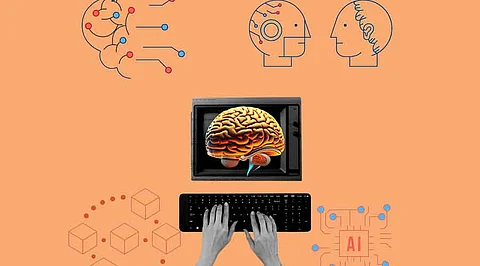

In recent years, the application of deep learning has transformed various industries. In robotics, it helps robots adapt to their environment in real-time. Virtual assistants use deep learning to personalize user experiences. Entertainment platforms provide tailored content recommendations. Deep learning's influence is widespread and it is effectively improving user interactions across multiple sectors.
Deep learning has revolutionized the field of robotics. Deep Learning enables the robots to process real-time updates from their sensors. This helps them to adapt to changing environments on the fly. They rely on deep learning algorithms to make sense of the sensory information they receive. This means that as the robots move, they continuously assess their surroundings and dynamically adjust their trajectories, which is crucial for safe and efficient navigation.
Virtual assistants have become integral parts of our daily lives. These are designed to comprehend and respond to voice commands and facilitate tasks like setting reminders, answering questions, controlling smart home devices, etc. Virtual assistants use deep learning algorithms to contribute to their continually improving user experience. These algorithms enable the virtual assistants to learn from each interaction. Over time, they adapt to individual user habits and provide increasingly personalized and relevant responses.
Online streaming giants have transformed the way we consume media, and their success lies in the application of deep learning. These platforms employ deep learning techniques to provide users with highly personalized content recommendations. Deep learning enables them to assess a user's preferences with the help of their browsing history. This data-driven approach allows the platforms to offer tailored suggestions. Users are more likely to discover new content they'll find interesting which ultimately leads them to spend longer times on these platforms.
Deep learning is becoming a critical tool in the realm of fraud protection and detection. In this sector, companies are leveraging deep learning's predictive analytics capabilities to identify fraudulent activities. By scrutinizing sequences of user behavior these organizations have reported substantial improvements in anomaly detection. Moreover, by constantly analyzing and learning from historical and real-time data, deep learning algorithms can adapt to evolving fraud tactics and patterns. This helps organizations stay ahead of the threat of these financial crimes.
By harnessing deep learning algorithms, advertisers can gain a deeper understanding of user behavior and preferences. This enables them to deliver highly relevant and personalized ads to users. As a result, deep learning not only helps advertisers benefit from improved ad performance but it makes users receive advertisements that are more aligned with their interests.
Deep learning's integration into the healthcare sector is nothing short of a game-changer. Deep learning models have demonstrated remarkable accuracy in analyzing complex medical images. This enables early detection of diseases like cancer. By providing healthcare professionals with enhanced diagnostic tools, deep learning not only increases the chances of early intervention but also contributes to more precise and personalized patient care.
Deep learning enables machines to learn the intricacies of music and help them to create original compositions independently. Deep learning machine understands the underlying musical structures, patterns and craft music.
Join our WhatsApp Channel to get the latest news, exclusives and videos on WhatsApp
_____________
Disclaimer: Analytics Insight does not provide financial advice or guidance on cryptocurrencies and stocks. Also note that the cryptocurrencies mentioned/listed on the website could potentially be scams, i.e. designed to induce you to invest financial resources that may be lost forever and not be recoverable once investments are made. This article is provided for informational purposes and does not constitute investment advice. You are responsible for conducting your own research (DYOR) before making any investments. Read more about the financial risks involved here.
